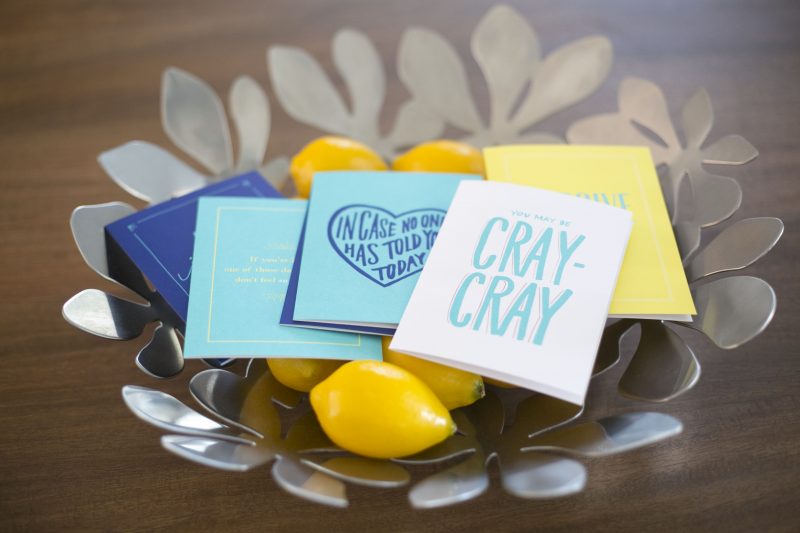A couple of years ago, I noticed the need for encouraging cards for those facing long-time illnesses—for those occasions when you just don’t know what to say. The wah-wah, platitude cards available at Target and Hallmark just weren’t cutting it.
After much prodding from sweet friends who wanted any ideas on what to say, I gathered a few of the most life-giving, do-no-harm words I had received. I put together a set of 6 bright and colorful What to Say When You Don’t Know What to Say Greeting Cards.

Cards like this:
“You may be cray-cray… but you’re my kind of cray-cray and that’s why I love you bunches.”
“I can’t imagine all you’re facing, but know the rest of us live in wonder & awe of you.”

We announced them on the blog, brought them to events, and noticed they were gone before we could restock again. People longed to know how to enter in with their loved ones facing difficult circumstances, devastating loss, horrific illness.
But early on, we began to notice a trend. Something pretty peculiar.
The packs of cards that had the card on top that read: “FORGIVE ME” weren’t being picked up.
We even had people remove the “FORGIVE ME” cards from their sets—informing us they weren’t interested in asking for forgiveness.
Now, it’s not your typical apology card. The full card reads:
“Forgive me. I haven’t told you as often as I should. I think about you more than you know. You are so loved and so cherished.”

Who wouldn’t want to receive that card?
Yet the difficulty comes in sending this card.
Maybe you’re like me—forgiving others comes easier than asking forgiveness.
I skirt the issue.
Convince myself my mistake wasn’t a big deal.
Justify my actions, responses, attitude.
Yet, freedom is found not only in forgiving but in receiving forgiveness.
Maybe the four words that will set you free are:
“Will you forgive me?”
Early on in our marriage, I suggested to Leif that whenever one of us acknowledged a wrong—whether one of us had committed or simply felt we’d been wronged—the person needing forgiveness had to ask, “Will you forgive me?”
The other person was free to say, “yes” or “Not right now—I need time.” Sometimes that “time” translated into a few minutes or a few hours to cool down.
But as soon as the other person said, “Yes, I forgive you,” they had to follow with three compliments about the other person. We call this the Three Kind Words strategy.
Any kind expression counted. Things like,
“I love being married to you.”
“I’m glad you picked me.”
“I love your generosity.”
“I appreciate the kindness you show others.”
“I’m grateful for your commitment to me.”
“I like cuddling with you.”
What I discovered is that by the time I said or received three compliments, any residue of resentment was gone.
The act of blessing or being blessed melted my hard heart.
 Over the course of the next week, consider practicing the Three Kind Words strategy with someone you know—a friend, a coworker, a roommate, a family member, or your spouse. Let us know how it went—both in blessing and being blessed by that person.
Over the course of the next week, consider practicing the Three Kind Words strategy with someone you know—a friend, a coworker, a roommate, a family member, or your spouse. Let us know how it went—both in blessing and being blessed by that person.
Describe a time where you’ve been forgiven and how that affected you.
Join us back at MargaretFeinberg.com on Monday, July 25th as we begin Week 7: Our Final Celebration during the online Summer Bible Study.



 Over the course of the next week, consider practicing the Three Kind Words strategy with someone you know—a friend, a coworker, a roommate, a family member, or your spouse. Let us know how it went—both in blessing and being blessed by that person.
Over the course of the next week, consider practicing the Three Kind Words strategy with someone you know—a friend, a coworker, a roommate, a family member, or your spouse. Let us know how it went—both in blessing and being blessed by that person. 





